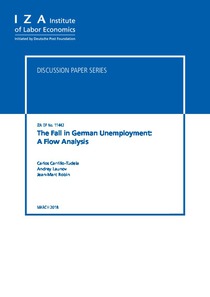The fall in German unemployment: a flow analysis

Carrillo-Tudela, Carlos ; Launov, Andrey ; Robin, Jean-Marc
Institute of Labor Economics, Bonn
IZA - Bonn
2018
48 p.
unemployment ; part time employment ; labour market reform ; welfare state
Discussion Paper
11442
Unemployment
English
Bibliogr.;Charts
"In this paper we investigate the recent fall in unemployment, and the rise in part-time work, labour market participation, inequality and welfare in Germany. Unemployment fell because the Hartz IV reform induced a large fraction of the long-term unemployed to deregister as jobseekers and appear as non-participants. Yet, labour force participation increased because many unregistered-unemployed workers ended up accepting low-paid part-time work that was offered in quantity in absence of a universal minimum wage. A large part of the rise in part-time work was also due to the tax benefits Hartz II introduced to take up a mini-job as secondary employment. This has provided an easy way to top-up labour income staggering under the pressure of wage moderation. The rise in part-time work led to an increase in inequality at the lower end of income distribution. Overall we find that Germany increased welfare as unemployment fell."
Digital
The ETUI is co-funded by the European Union. Views and opinions expressed are however those of the author(s) only and do not necessarily reflect those of the European Union or the ETUI.